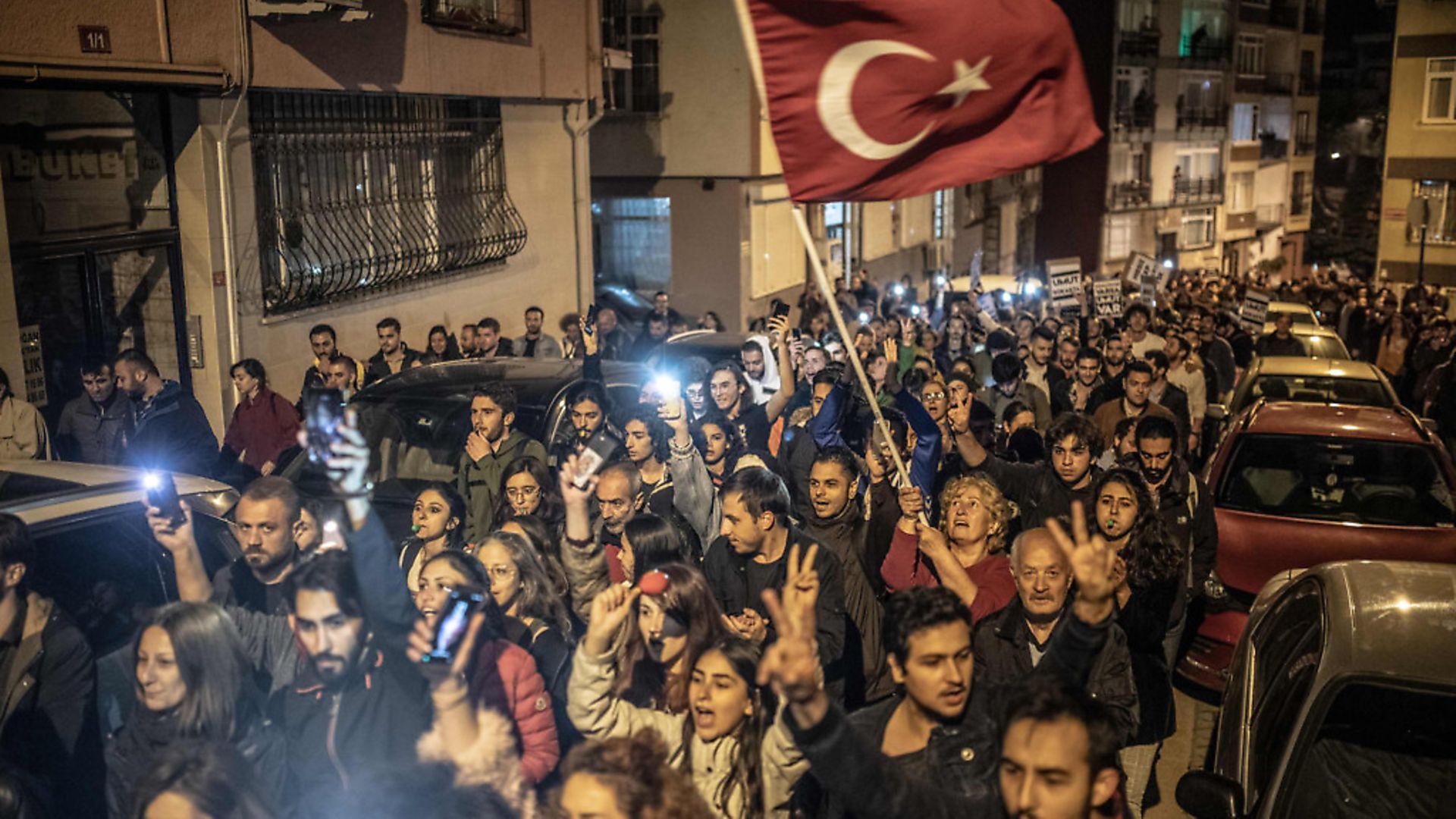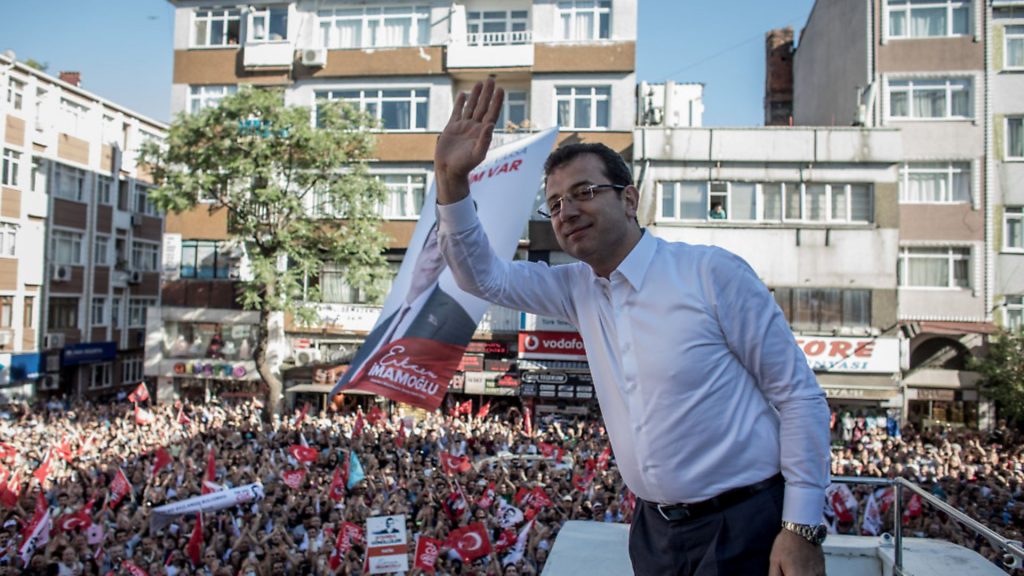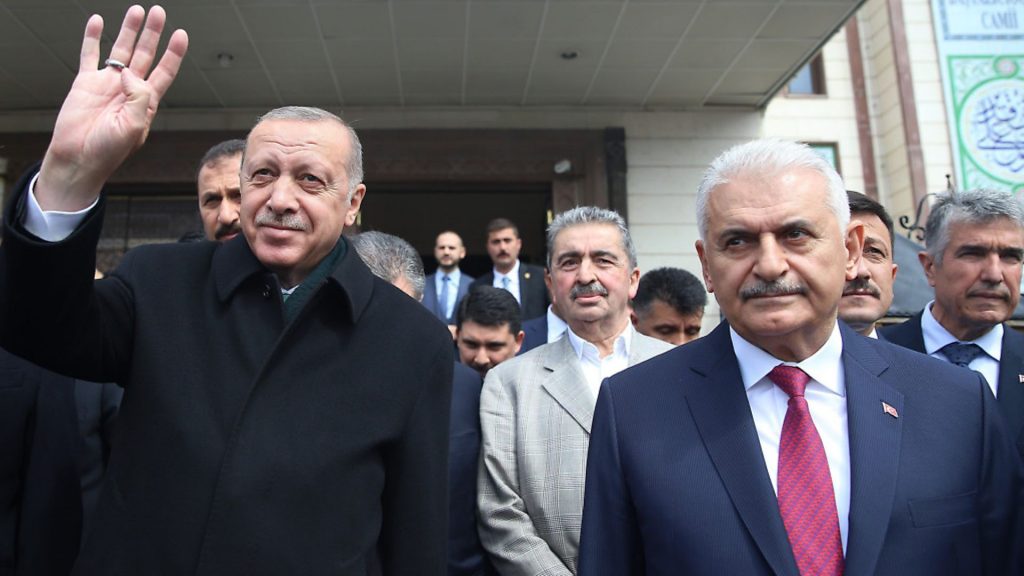
An election in Istanbul this weekend represents a critical moment in Turkey’s descent into authoritarianism. As Suna Erdem reports, the stakes are perilously high.

It’s election time in Turkey again. As is now traditional, critical journalists are being beaten in the streets, political opponents attacked as “terrorists” and “traitors”, writers sued over their fiction and petrified officials tasked with justifying government-backed trickery with impenetrable, thinly evidenced statements.
The latest high-stakes poll – one of a series that has run almost constantly since 2015 – is a re-vote, on June 23, of Istanbul’s mayoral election. It was scheduled effectively because the authoritarian, populist president Recep Tayyip Erdogan didn’t like result of the last one in March, and demonstrates the dark but ludicrous democracy the Nato-member, European Union-aspirant country has become.
That should be enough for any Brexit voter to quit worrying about the prospect of “70 million Muslims flooding into our country” to claim benefits and harass the natives via Turkey’s imminent EU membership. Turkey’s EU accession process, which began to great enthusiasm in 2005, is all but destroyed by the increasingly unhinged behaviour of Erdogan and the frightening deterioration of the rule of law there.
For if Turkey’s imminent membership were unlikely back in 2016, when it became a contested part of Britain’s referendum debate, it is even less likely now. Erdogan, such a strong advocate of the EU in the early years of his presidency, has turned his back on pretty much all the norms required – human rights, rule of law, institutions that at least pretend to be independent, adherence to basic democratic tenets and a functioning, rational economy.

Nevertheless, until now, Erdogan, a proud majoritarian, had contained himself when it came to challenging democratic votes. He has threatened, cajoled, meddled and encouraged dubious practices, even called early general elections with doubtful rationale, but he hasn’t outright refused to accept a result.
Despite its rickety democracy, this sort of thing didn’t happen in Turkey – even the military junta that took over in a bloody coup in 1980 accepted the defeat of its candidate in the first election that followed.
Now Erdogan has crossed a line. When on March 31, it emerged that the opposition candidate, Ekrem Imamoglu, had edged a win over Binali Yildirim, the former prime minister and candidate for Erdogan’s Justice and Development Party (AKP), everyone was shocked. Erdogan – who was mayor between 1994 and 1998 – his party or its predecessor had controlled Istanbul for a quarter of a century.
Now, by just 13,000 votes from a turnout of nearly nine million, a member of the opposition Republican People’s Party (CHP) had enticed enough Istanbulites to push them out. That he has done this with a popular message of inclusivity – drawing support from the left, the right, Kurds, liberals and the devout – is even more frightening to Erdogan as it recalls the original appeal of the current president when he took his first steps from mayor to hugely popular leader of the country.
But then, in May, the High Election Board (YSK) finally bowed to sustained pressure from Erdogan and his party and scrapped the vote over convoluted allegations of irregularities. Imamoglu, only 19 days into his term as mayor, was ousted and must now campaign again.
“At no point since it was set up in 1950, with the cooperation of the government and the opposition, had the YSK made a decision that caused such a breach of trust (in the institution),” commented veteran conservative journalist and legal expert Taha Akyol.
Erdogan is going all out to make sure his candidate – a reportedly reluctant Yildirim – wins this time and ensures that control of the city remains in AKP hands.
With a population of 15 million, Istanbul accounts for around a third of Turkey’s economy. Whoever runs it oversees big money contracts whose grateful recipients happily contribute to party coffers. It is also highly symbolic both for Erdogan, who grew up in the mean streets of the city and began his political career there, and for any party aspiring to run the country. As Erdogan himself says: “If we lose Istanbul we lose Turkey.”
This means that both at a municipal and national level, nothing will be left to fate. Cumhuriyet, a rare opposition newspaper in a media scene made sycophantic through crony ownership and downright fear, has been investigating possible electoral roll fraud.
These include claims some Imamoglu supporters have had their names removed from voters’ lists and that AKP officials may add the names of hundreds of thousands of migrants – likely conservative, probably AKP voters – who live in Istanbul but are registered elsewhere. Officially, the electoral roll will be the same as on March 31.
The summer election date is also significant – it will mean the many, mostly anti-Erdogan, students studying in the city may have gone home, while more affluent, republican-voting Istanbulites usually sun themselves on Turkey’s southern beaches at this time of year. However, travel companies are reporting a rise in changed or new bookings by people determined to be there to vote.
Despite every effort from the government, Imamoglu’s stock is, if anything, higher than before. By taking him on, Erdogan has turned this into an ‘us and them’ moment – a showdown between the thwarted mayor-elect and the president.
Given the public’s growing disaffection with AKP over the economy, which is now in recession, and growing distaste at the behaviour of the government and its supporters, that is risky. This is being reflected in opinion polls.
Imamoglu is now seen by many – even among AK supporters – as being unfairly deprived of his post, meaning that he already wears the mantle of martyrdom Erdogan successfully used for so long when he won elections as a man of the people blocked out by the sneering secular elite.
His appeal to the electorally crucial, restive Kurdish minority is significant. Although they have suffered badly since Erdogan abandoned his own peace process after a pro-Kurdish party threatened his majority in the 2015 general election, Kurds are rightly sceptical of the CHP’s patchy record on Kurdish rights.
Imamoglu’s clear, unifying message, reminding people that they don’t need to hate each other even if they disagree, has resonated across the divided country.
In contrast, Erdogan’s increasing bellicosity is finally alienating more people than it attracts. The charge sheet against his supporters growing.
Last month at the Hay Festival, Elif Shafak, one of the most internationally celebrated Turkish writers, said that prosecutors were now coming after her and others for depicting challenging subjects such as child abuse and sexual violence in their novels – both problems that Turkish justice has failed to deal with in the real world. Shafak has been tried and acquitted before for the comments made by her fictional characters – but that was years ago, by the remnants of the nationalist powers-that-be that Erdogan claimed he was going to sweep away.
At around the same time, Yavuz Selim Demirag, a columnist critical of Erdogan, was attacked in the street by six men with baseball bats after appearing on a television talk show. This fits with a pattern of violent men turning up to ‘punish’ people, following critical Tweets or comments by government supporters. It is a pattern that has been condemned by Turkey’s Journalists’ Association: “Politicians who have difficulty espousing the idea of freedom of media and of expression and turn newspapers and journalists into targets, play an important role in these types of attacks.”
One recent piece of news has shocked even the most jaded of Turkish human rights watchers. This was a report, first brought to public notice by the Ankara Bar Association, claiming that several former diplomats were tortured and threatened with anal rape with truncheons, after their recent arrest in connection with a 2016 coup attempt that Erdogan blames on followers of his erstwhile ally, the exiled Muslim cleric Fethullah Gulen.
These generally highly-educated diplomats were accused of cheating in exams – which they deny. The foreign ministry is widely believed to have Gulen sympathisers among its staff. (Even anti-Erdoganists accept this, although it does not mean they were actively part of the coup.) But there are suspicions that these detentions – three years after the failed coup – may be part of an attempt to discredit former AKP foreign minister and prime minister Ahmet Davutoglu, who has been thinking of forming a new political party to challenge Erdogan.
In his desperation to hang onto Istanbul and ensure that he is the president in charge when the Turkish republic celebrates its 100th anniversary in 2023, Erdogan has exhibited many signs that he is losing it politically, unintentionally raising Imamoglu’s profile in the process.
When Imamoglu began to tour the Black Sea region, from where both he and Erdogan originally hail, it was with expectation of some interest, but even the CHP was surprised at the enthusiasm that greeted him following systematic government attacks and obstructionism.
One ‘slur’ put about by his opponents – the suggestion that Imamoglu was hiding his “true, Greek Christian identity” – has backfired badly. When Haberturk journalist Muharrem Sar?kaya asked a senior AKP source why they decided such cheap propaganda was a good idea, the source said, with a shake of his head: “If only I knew…”
All this points to a leader on the way down. If Erdogan loses Istanbul again, he may not survive to 2023 after all. But he has dug himself out of holes before, so he is by no means yet done. There are worries that he is already working out how to overturn a second Imamoglu win.
The cumulative effect of this has been that the EU, already beyond frustrated at the democratic deterioration of an ally close to the troublesome Middle East with which it has useful security and trade links, is seeking ways to put its foot down.
In its latest annual report on Turkey, the European Commission lashed out in the strongest terms yet at Ankara’s abysmal backsliding on human rights and said Turkey’s accession process had “effectively come to a standstill”.
It cited damning statistics, that the total number of people in prison without indictment or trial stood at 57,000 in December, comprising 20% of the total, and growing, prison population. The re-vote of the Istanbul municipal election went “against the very core of democratic electoral process”.
“Sitting in a cell for 17 months without knowing what you are being accused of, that is reality in today’s Turkey,” said the European parliament’s Turkey rapporteur Kati Piri, who back in March sponsored a resolution in which the parliament voted to demand an official freeze on the membership process. The EU process was ailing even before Erdogan responded to the coup attempt with a witch-hunt style purge and in 2017 compared the Dutch and German governments to Nazis.
The EU says Turkey’s crackdown on dissidents, the collapse of an independent judiciary and a turn toward authoritarianism are incompatible with the bloc’s values of democracy and freedom of speech.
Turkey is also engaged in a row with the US over its proposed purchase of a Russian anti-missile system, amid accusations that Ankara, with one of Nato’s biggest armies, would compromise US and international security. Turkey risks being removed from joint military training and faces sanctions. Another row, over US support for and reliance in Syria on Kurdish fighters that Turkey says are linked to separatist Kurdish guerrillas on its soil, is simmering still.
Even in its current friendless state, it’s still hard to see Turkey completely breaking away from the EU and the West – although if Imamoglu is pushed out in a dubious manner it will be getting close – but it’s also hard to see how in the foreseeable future this slide can be reversed either.
Brexit doesn’t help. The irony here is that the UK, which voted Leave partly for fear of Turkey’s EU accession, was one of Ankara’s biggest supporters. Brexit, plus turmoil on the continent has led to the EU focusing inward, and Turkey is unlikely to find a sympathetic hearing from the new set of MEPs – many from the far right, left-liberal and Green movements, none historically fans of Turkish accession.
If Erdogan manages to keep Imamoglu out of Istanbul Town Hall this Sunday, by whatever means, the likelihood is that Turkey’s downward spiral will continue. If Imamoglu wins, and is this time allowed to stay in his post, those hoping for Turkey to regain its senses might find some succour that the Erdogan juggernaut has at least faltered.
Either way, Erdogan still holds all the cards, so the Turkey-EU stalemate could continue for quite some time yet.










